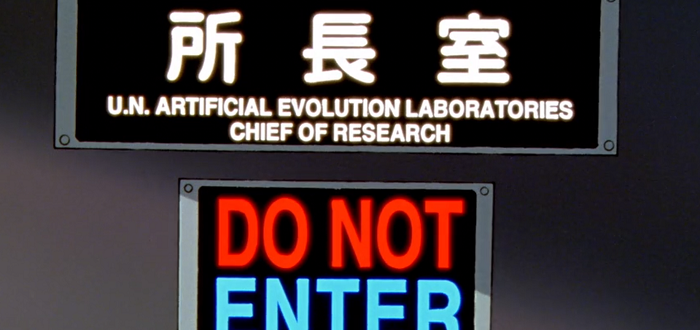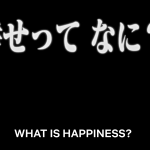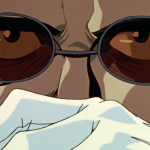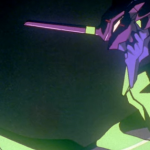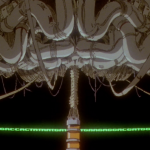Revangelion: Part 21 – The Cruel Birth of NERV
Amid an episode that is meant to add clarity to Evangelion’s opaque and, dare I say it, impenetrable backstory, I want to return to the four questions I posed at the start of this experiment.
What does this series make me feel?
Angry.
What is it asking me to do?
Therapy for its creator.
What should I be taking away from it?
That Hideki Anno has a lot of hangups and not much to say beyond those hangups.
Is there anything to take away from it?
Being seminal doesn’t make something good.
With respect to the first question, I don’t want to say that I’ve lost patience with Evangelion. I’ll acknowledge that my growing levels of frustration might be a side effect of the deep dive approach to reviewing a seminal series. I do, however, find myself annoyed with Evangelion’s effort at ham-fistedly mashing flashbacks into a desperate attempt to give the audience some level of context on Gendo’s endgame. Thus, the problem with this episode, which can be applied retroactively to much of the series, is that I don’t know if the audience is suffering at the hands of bad editing or an auteur who refused to be edited.
Looks at the camera like Jim from the Office. Past-Adam is afraid of you, dear reader. He thinks that if he doesn’t hedge his bets like this, you won’t like him anymore. He’s afraid. I’m not. It is August of 2020, the year of our plague god Nurgle, and my benchmark for fear has changed since initially crafting these words.
So I’ll tell you the truth he was trying to hide. He had lost patience. He was sick of it. The show was frustrating him to no end, and he felt trapped by the hubris of undertaking a project where personal growth between his 20s and 30s should offer some great revelation into this series. The absence of those insights called the validity of his personal growth into question.
Have you ever doubted the quality of your personal growth? Then you can understand why he felt stupid and insecure. If not, then you’ll see what I’m talking about given Past-Adam’s bloviation. He was desperate to make something of this episode.
In terms of measurable plot, this episode is supposed to be about NERV’s second-in-command being kidnapped by Seele, NERV’s enigmatic patron organization. On that note, there is something to be seen in a council of obvious riffs on the monolith from 2001 A Space Odyssey interrogating Deputy Director Fuyutsuki. The thirteen or so monoliths snapping to life out of the darkness tell Fuyutsuki – and the audience – that Seele never wanted to create a new god in an awakened Eva-01. Yet they, themselves, are appearing as icons synonymous with humanity being uplifted by an unknowable force.
It might be a throwaway tableau if not for the fact that a flashback in the episode shows Gendo working at the UN’s Artificial Evolution Laboratory. Bearing this in mind, I won’t deny that there isn’t some thoughtful hand of the artist at work in this moment.
Meh. My past-self is stretching this visual reference to a much more ambitious and equally obtuse work of fiction to mean something more than meets the eye. It’s a cool reference, but that’s all it is. Get on with it, Past-Adam.
In terms of the third question – it’s pretty clear that the series wants me to understand that Evangelions and the Human Instrumentality Project are about the next phase of human existence. If only the balance of this episode brought such clarity to the story.
And this has been the problem all along. If a show can be about whatever the audience wants to make of it, then it is equally fair to assert that Evangelion is about nothing at all.
Evangelion becomes the Seinfeld of anime: a series of set pieces that are fascinating in their own right, but form only a shambling Cronenberg monster when they try to come together. This single episode shows that even within the confines of its own continuity, Evangelion has the cohesion and elegance of a 9 legged turtle.
Much of the episode takes place through flashbacks narrated by Fuyutsuki, Ritsuko, Ritsuko’s mom, and Misato. This yields a non-cohesive mess. There’s a frantic pace as the episode jumps from one plot thread to the next. Fundamentally, though, there’s no sense to the narration. Why would Fuyutsuki, who has been kidnapped by Seele, be explaining Seele’s origins to Seele?
Within the story’s internal consistency, Seele should be putting questions to Fuyutsuki, so he could be the audience’s proxy. Instead, the old man drones on about backstory that might have been useful episodes ago, but now comes across as a harried, eleventh hour effort to make up for an excess of enigmatic writing. At its worst points, the writing forgets who Fuyutsuki is supposed to be talking to, reducing large swaths of the episode to bizarre incursions against the fourth wall.
What makes matters more frustrating is that in a moment when the audience is meant to add to their understanding of the story, the writing’s expository flashbacks pound away with new nomenclature and expansions to the overall mystery box. Yes, this is the episode that tells us that Yui Ikari was working on Eva-00 with Gendo. Does it show us how she died? No. Only that she claimed her work was for the future and for Shinji. Does it show us if that “for Shinji” was a literal explanation for why he could pilot an Eva without training? Nope. Does it show us why Ritsuko’s mom was hooking up with Gendo? Nyet. Does it help us to understand if Gendo really did kill Yui? Neg. Does it give us anything that might help us understand the central father-son conflict between Shinji and Gendo? いいえ
And if Yui Ikari’s soul really is housed in Eva-01, then there’s a whole lot more to Eva-01 absorbing Shinji and filing his head with naked visions of seduction from work-mom, NERV’s worst employee, and teenage clone-mom. Then again, what moms don’t want their son to get wild with a teenage clone of themselves? I understand that is standard mom fare.
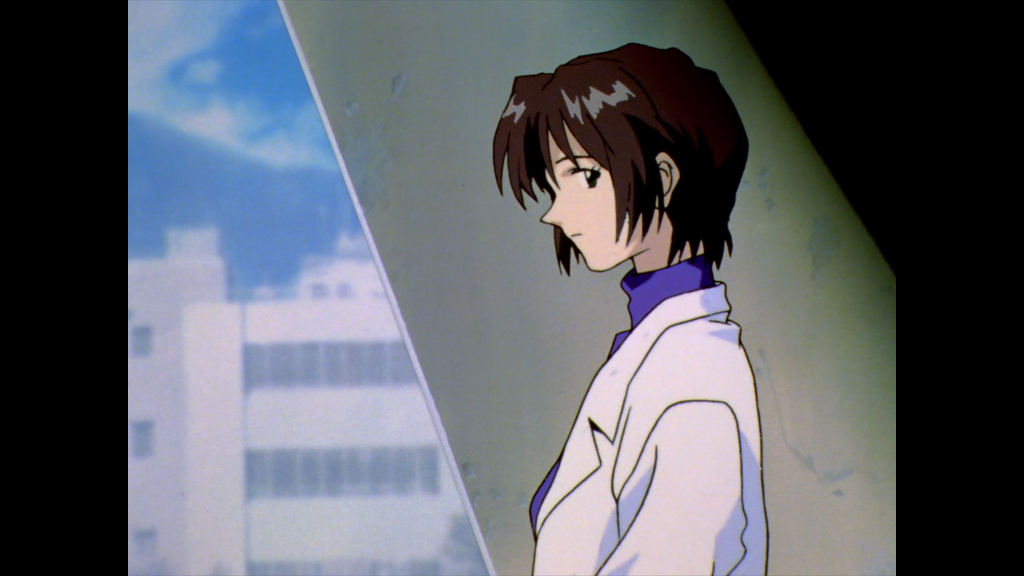
This episode is all overcooked pasta thrown at the wall with so much of it landing in a starchy heap on the kitchen floor. It tells us that Rei is a clone without showing us why this was either necessary or important to the story. It tells us that Misato really did love Kaji when they were students, but leaves the details of their break-up to Misato’s drunk rambling some episodes back. It confirms everything Ritsuko ever said about her mom without adding anything new beyond Mom Ritsuko choked out child-clone Rei before seemingly killing herself…I guess.
Yeah, it escalates pretty quickly from a lover’s jealousy to child murder.
Which brings us to the episode’s most important two minutes. Kaji, despite kidnapping Fuyutsuki at Seele’s request, releases Fuyutsuki – because double agents going to double agent…I guess. Meanwhile, Misato gets out of NERV jail, having been held by NERV’s intelligence division on suspicion of being in on Kaji kidnapping Fuyutsuki. The next scene shows Kaji meeting with…someone…in NERV’s basement whereupon he gets shot.
I don’t think that Misato shot him. Though a case could be made for her killing the personification of her father in some fit of an Elektra Complex. Hey, don’t blame me for going psych 101 on this series. I’m not the one who sees ad hoc cross explosions in every other episode and writes doctoral dissertations on the deep religious symbolism of Evangelion. There was also the final scene in episode 15 when Misato, still very much loyal to NERV, pulled a gun on Kaji. Though I think the awakening of Eva-01 is meant to show she has moved past that toward distrusting her employer.
Also their fucking a couple episodes back. Don’t forget the fucking.
Tl;dr, twenty minutes of flashbacks don’t illuminate much other than a few things I have been banging on about since word one. They culminate in Kaji’s off-camera death at the hands of who the hell knows. The final scene is Misato returning home and finding a voicemail from Kaji. He apologizes for making her life complicated and promises to say the words he could not say if he sees her again. Misato then breaks down into tears.
This is where I will offer a new thesis for consideration. Shinij Ikari is a shitty person, and we give him far too much leeway.
Shinji’s response to Misato in abject agony is to hide in his bedroom. Walkman on, head under a pillow, Shinji mutters: “I knew there was nothing I could do. Nothing I could say. I was just a child.”
I think this is the line for me. I don’t think I can look at this scene, one I forgot existed, and trot out the Shinji-as-victim defense for a shocking act of indifference.
For all the bad days that I’ve had in my life, I can’t fathom one where I would turn my back on a would-be surrogate mother/boss/crush who was crying 3 feet away from me. It’s not endearing. It’s alienating. If Shinji has the wherewithal to demand that people be kind to him amid his communion with Eva-01/his inner self, then I expect he should be able to offer that to people when they need it.
But Adam, that’s the point. Shinji is supposed to be broken.
Okay, sure. Let’s explore that idea a little. We certainly could interpret everything that has happened to Shinji as rendering him incapable of compassion. He has been weaponized by NERV, though the story really dropped that plot thread in the second act, and emotionally brutalized by his father. For all we know even St. Yui Ikari, Shinji’s idealized female form, had a hand in shaping his fate as the only one who could pilot Eva-01. Thus, the argument would be that Shinji is out of spoons because of the external pressures placed upon him.
However, If we accept that argument as a given, then what we are doing is saying that Shinji, a character with barely any agency, has found his steel in ignoring the needs of others. Every other episode shows that Shinji’s sense of self is under-developed. He is keen to be used by those around him in a singularly teenage search for approval. Why should this moment be any different than Shinji’s other efforts to be liked and needed?
It’s enough to make someone think Asuka is right to give him the business. Granted, Asuka remains a crappy co-worker. However, what if she is the narrative voice that acknowledges there’s a limit to which one can make space for someone else’s bad day? Or in Shinji’s case, someone else’s endlessly bad decisions that lead to a complete shit show of co-dependence.
Not to get too weird, but the writing likely keeps Shinji away from Misato because if he so much as put a hand on Misato’s drunk-ass and compulsive shoulder, she would probably fuck the living daylights out of him in a fit of grief.
Frankly, I call creative cowardice on not taking the story to a truly messy place considering all the other fuckery that goes on in “The End of Evangelion” – say nothing for the next episode when we learn about Asuka being a full-blown sex pest with Kaji – as evidence that Hideki Anno was thinking about this as much as anybody else.
Don’t pretend you don’t know what I’m talking about.
Shinji can not exist in a place of wanting people to like him, but then conveniently walk away from an act of compassion that would probably make Misato love him simply because the plot demands Shinji suffer in silence. I don’t like it. I don’t like being manipulated into feeling sorry for Shinji; I want to give him a talking to about how is being selfish and petulant.
In fact, let’s really put cards on the table to head off the inevitable accusations that I am being insensitive. I know that everyone is going to see something of themselves in Shinji Ikari. We end up in this place because we’ve all had something bad happen to us. This isn’t a connection between text and audience; this is the writing mobilizing empathy as a trick to evoke a willingness to forgive and comfort Shinji/Hideki Anno. But this is not a therapy session.
I’m here for a story. The audience should not be expected to absolve writing, characters, or creators that are so slipshod as to necessitate thousands upon thousands of words of analysis to make any sense of the topic at hand.
Either by intention or accident, episode twenty-one must serve as a deconstruction of Shinji Ikari as the blameless victim of this story. Because, either by intention or accident, the character fails to offer the compassion he feels entitled to – indeed, that he demands – from the world around him. Combine this with the fact that so much of this episode’s efforts at bringing clarity to Evangelion’s long arc are actually a narrative mess, and I’m not inclined to extend any more benefit of the doubt to what the subtext may or may not be doing.
Evangelion is at the limit of its credit, and I know that the last few episodes are nothing more than a scramble before the finale defaults on the loan.
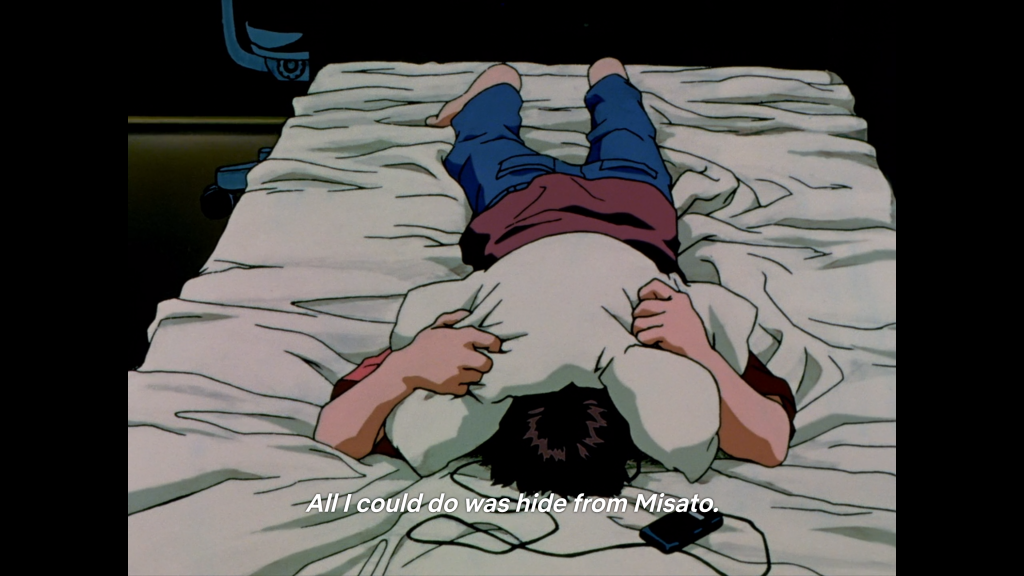
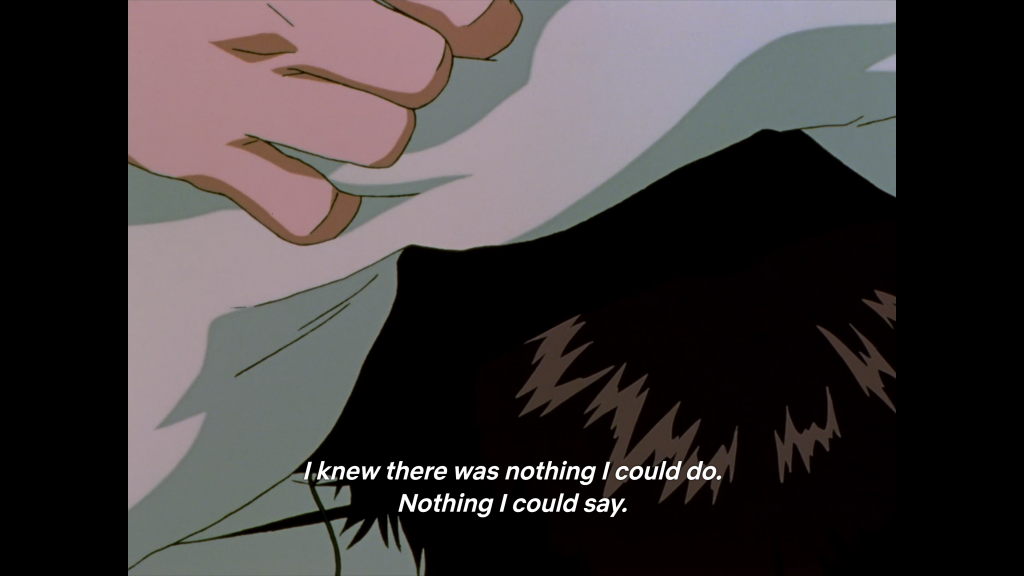
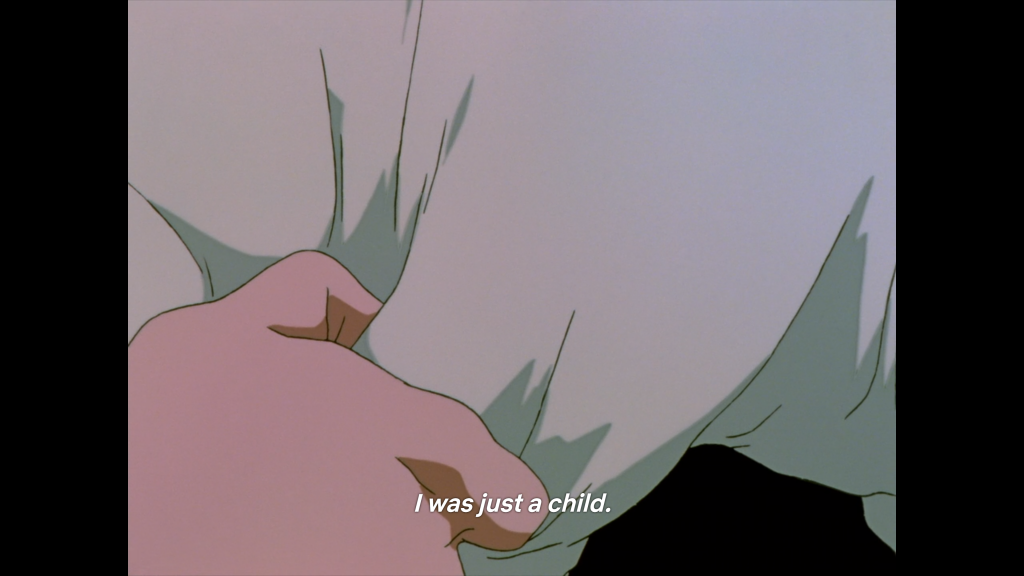
And so, after dedicating two-thousand words to this episode, I will reduce its only cohesive character/plot thread to a single, gut punch of a thought: Shinji Ikari is a fucking jerk.
A note from a version of me who has finished watching the entirety of the series, for a third and final time, and is now free to connect the dots that past-Adam could not quite see:
Shinji Ikari is a fucking jerk. What more need be said?

